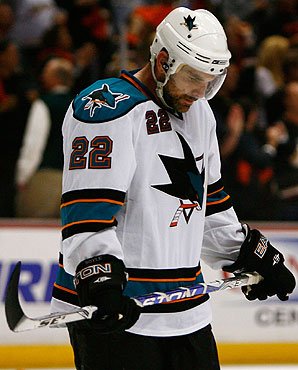
Lack of urgency contributes to another failed season in San Jose
The problem Monday night? With their playoff lives on the line, the Sharks offered up one period of urgency. One period in which they displayed an understanding that postseason hockey is an entirely different game, one that demands a completely different set of sacrifices. There couldn't be any finger-pointing in that room after this one -- not one player was able to put together a night's work he can be proud of.
Aliens could have landed at center ice. Brad could have reunited with Jennifer. Don Cherry could have pronounced the name of Alexander Ovechkin correctly. Nothing could have been more shocking than seeing Joe Thornton and Ryan Getzlaf drop the gloves two seconds after the opening draw and engage in a very spirited tussle.
Though Getzlaf was the initiator (apparently as payback for what he thought was some cheap thuggery on the part of Thornton in Game 5), Jumbo Joe skated away with a clear decision. It seemed to give the Sharks a boost out of the blocks as they carried the play early, frustrating the Ducks into three penalties with their aggressive forecheck and opening the scoring with Milan Michalek's power play marker midway through the first. But then . . . nothing.
Instead of stepping on Anaheim's throat and taking a raucous Honda Center crowd out of the equation, the Sharks let the Ducks back in the game with a couple of lazy penalties of their own. Corey Perry tied it up with the extra man, and the Sharks failed to launch any real sustained pressure until midway through the third -- a point at which the game was essentially over.
No more excuses for Jumbo Joe
Before the contest, San Jose coach Todd McLellan complimented Thornton's efforts in Game 5, but said he'd have to bring more on Monday if the Sharks hoped to make it home for Game 7. Didn't quite work out that way and honestly, it's time to stop making excuses for the guy. The tussle may have lit a fire under his behind, but by the time he got out of the box there was nothing left but a few weak puffs of smoke.
Thornton was all but invisible after the first period and ended up counting just one shot on net in nearly 18 minutes of ice time. Says a lot about the team's offensive centerpiece that he played four minutes less per night than Getzlaf. Sure, Getzlaf plays more minutes on the PK, but considering how much time the Sharks spent trailing in the series, it's a wonder Thornton wasn't double-shifted in the clutch. Maybe that's it . . . the clutch isn't exactly where he shines.
That said, there's no way Thornton will be the one sacrificed for this year's annual failure. Marleau wore the C, and if he displayed any leadership in this series it must have been behind closed doors. There was none to be seen on the ice in five of the six games. He has a no-trade clause, but you have to think there will be discussions to determine if the two sides would mutually benefit from a parting of the ways.
Counter the play of the top Sharks with that of Getzlaf, Perry and Bobby Ryan. The Ducks trio plays an aggressive style that's better suited to trench warfare of the playoffs, but they still managed to elevate their game when it counted. All three spent considerable time within halitosis distance of Evgeni Nabokov, and all three gladly paid the price. Thornton's line simply couldn't match their intensity.
• Nabokov wasn't bad in Game 6 -- certainly he wasn't fighting himself as he had in previous San Jose losses -- but he still failed to make the big stop when his team needed it most. Perry's tip-in was a tough chance, but coming just 2:14 after Michalek had given them the lead, it was exactly the save the Sharks needed. Same story with Francois Beachemin's second-period tally. Dan Boyle's inadvertent deflection didn't help matters, but consider the impact. If Nabokov stops that one, it's still a 2-1 game. Instead, it gets by him just 1:23 after Teemu Selanne's go-ahead goal and the fight went out of the Sharks. Game over.
• One of the big questions going into the series was whether the Ducks would place their fate in the hands of veteran J-S Giguere or Jonas Hiller, the more effective of the pair down the stretch but a player who'd never experienced a minute of postseason action. Randy Carlyle's hunch to go with the kid paid off handsomely. Though the Ducks were outshot in every game of the series (San Jose averaged 38 per night), Hiller allowed just 10 goals in six games. He didn't just make more saves, he made big saves that affected momentum. Great stops on a Boyle slapper in the first and another that was tipped on net by Ryan Whitney gave the final result a feel of inevitability.
• You can't say enough about the work done by the Anaheim defense, especially Chris Pronger and Scott Niedermayer who were paired together for much of Game 6. While the unit did give up a lot of shots, their control of the middle of the ice forced San Jose to settle for low-quality chances from the points and the perimeter. On the rare occasions when Hiller burped out a juicy rebound, they swallowed up the loose pucks first -- primarily because they kept incursions by Sharks forwards to a minimum.
• Interesting stats from the series: Anaheim outscored San Jose 9-2 in third period play and 12-5 at even strength.




